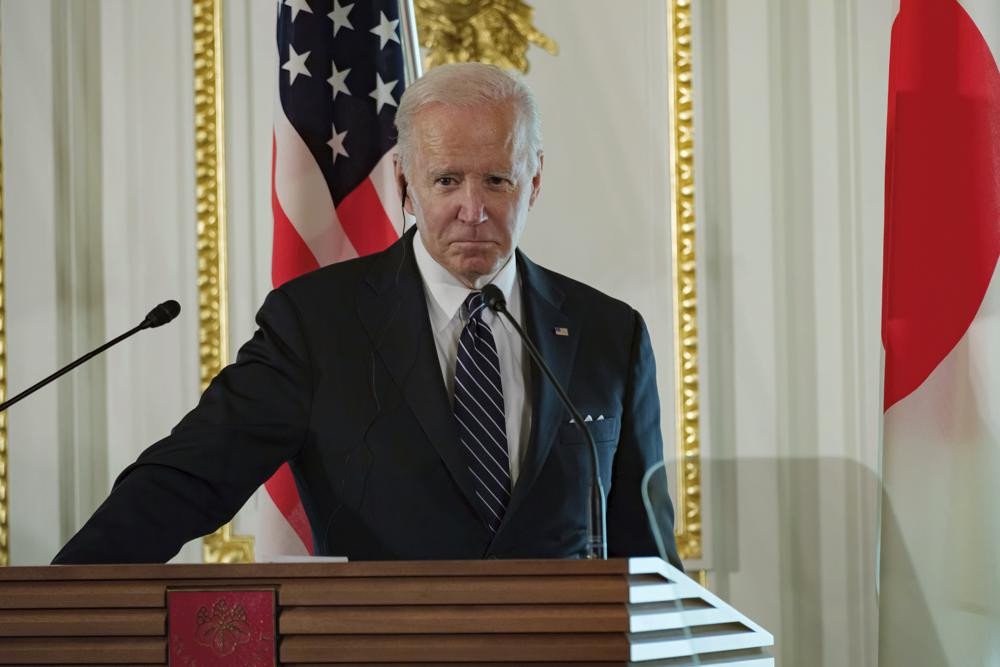US President Joe Biden is winding up his visit to Asia on Tuesday by holding talks with a quartet of Indo-Pacific leaders that includes Australia’s new prime minister and India’s Narendra Modi, with whom differences persist over how to respond to Russia’s invasion of Ukraine.
Biden will meet separately with the newly-sworn in Anthony Albanese of Australia and with Modi after a four-way gathering of the security group known as the Quad. The partnership, which includes the U.S., Australia, India and Japan, has become increasingly relevant as Biden has moved to adjust U.S. foreign policy to put greater focus on the region and to counter China’s rise as an economic and security power.
Looming over the Quad leaders’ talks will be Biden’s blunt statement on Monday that the U.S. would intervene militarily if China were to invade Taiwan, saying the burden to protect Taiwan is “even stronger’ after Russia’s invasion of Ukraine. The White House insists that Biden’s unusually forceful comments about Taiwan did not amount to a shift in U.S. policy toward the self-ruled island that China claims as its own.
Going into the Quad meeting, White House officials said the situation in Ukraine would be on the agenda. Biden on Monday was effusive over Japan’s efforts to levy sanctions on Russia, and send humanitarian aid to to Kyiv.
But the White House has been disappointed with India’s response to the invasion.
Biden has asked Modi not to accelerate the buying of Russian oil as the U.S. and other allies look to squeeze Moscow’s energy income. The Indian prime minister made no public commitment to cut off from Russian oil, and Biden has publicly referred to India as “somewhat shaky” in its response to the invasion.
Unlike other Quad countries and nearly every other U.S. ally, India has not imposed sanctions or even condemned Russia, its biggest supplier of military hardware. Facing Western pressure, India has condemned civilian deaths in Ukraine and called for an immediate cessation of hostilities. Yet it also has compounded fallout from a war that has caused a global food shortage by banning wheat exports at a time when starvation is a growing risk in parts of the world.
Biden and Modi spoke about the Russia invasion during a virtual Quad leaders’ meeting in March, and last month they had a short video conversation when Secretary of State Antony Blinken and Defense Secretary Lloyd Austin met with their Indian counterparts in Washington.
“So it won’t be a new conversation,” White House national security adviser Jake Sullivan said. “It will be a continuation of the conversation they’ve already had about how we see the picture in Ukraine and the impacts of Russia’s brutal invasion of Ukraine on a wider set of concerns in the world.”
While Biden and Modi may avoid public confrontation over how to respond to Russia’s aggression, the issue remains a major one as the U.S. and allies are looking to tighten the pressure on Putin., said Michael Green, senior vice president for Asia at the Center for Strategic and International Studies in Washington.
“It appears pretty clear the Biden administration is not looking for trouble with India and that most of these difficult conversations will be in private,” said Green, who was a senior National Security Council aide during the George W. Bush administration.
Some modest initiatives were expected to be announced by the Quad leaders, including a new effort to provide pediatric COVID-19 vaccines to countries most in need and a program to help nations improve security and environmental awareness of their territorial waters, according to a senior administration official who previewed the coming announcements on the condition of anonymity.
The Quad last year pledged to donate 1.2 billion vaccine doses globally. So far, the group has provided about 257 million doses, the official said.
Biden will also meet with Albanese, who was sworn in Monday and immediately flew to Tokyo for the summit. The leaders spoke by phone after the center-left Labor Party leader defeated Prime Minister Scott Morrison, ending a nine-year run of conservative rule in Australia.
When Biden was asked Monday about whether the U.S. would take military action should Beijing invade Taiwan, he said, “That’s the commitment we made.” He added that the idea of China taking Taiwan by force “is just not appropriate,” likening it to Russia’s invasion of Ukraine.
Biden prefaced his answer by saying that U.S. policy “has not changed at all.”
Still, the U.S. traditionally has avoided making such an explicit security guarantee to Taiwan, with which it no longer has a mutual defense treaty. It instead maintains a policy of “strategic ambiguity” about how far it would be willing to go.
The 1979 Taiwan Relations Act, which has governed U.S. relations with the island, does not require the U.S. to step in militarily if China invades, but makes it American policy to ensure Taiwan has the resources to defend itself and to prevent any unilateral change of status by Beijing.
Japanese officials also sought to play down Biden’s comments on Taiwan. Japan’s Deputy Chief Cabinet Secretary Seiji Kihara told reporters that “Japan and the United States have not made any policy shift on Taiwan.”
The issue is of no small concern to Japan. Some 55,000 U.S. troops are based in Japan, with the bulk in Okinawa, just 100 kilometers (60 miles) west of the westernmost part of Taiwan.

